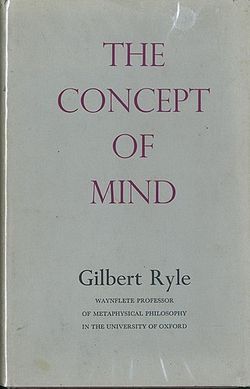- The Concept of Mind
-
The Concept of Mind
The 1963 Hutchinson edition of The Concept of MindAuthor(s) Gilbert Ryle Language English Subject(s) Philosophy of mind Publisher University Of Chicago Press Publication date Original 1949; Current edition 1984 Media type Paperback ISBN 0226732959 OCLC Number 10229750 Dewey Decimal 128/.2 19 LC Classification BF161 .R9 1984 The Concept of Mind (1949) is a book by the philosopher Gilbert Ryle. It argues that the concept of "mind" is "a philosophical illusion hailing chiefly from Descartes and sustained by logical errors and 'category mistakes' which have become habitual." Richard Webster praises its "lucidity and vigour", but suggests that while Ryle's argument effectively dissolves the mind-body problem, its case that the remaining subjective aspects of our experience, consisting of our sensations, memories, consciousness and sense of self, are not the essence of "mind" has not been universally accepted by contemporary philosophers, neuroscientists, and psychologists, with the result that its arguments have "failed to bring about the revolution in human knowledge they might reasonably have been expected to." Webster sees Ryle's willingness to accept the characterization of The Concept of Mind as behaviorist as misrepresenting its more nuanced position, writing that Ryle's acceptance of that description is far from "harmless", as Ryle himself suggested. Webster stresses that Ryle "does not seek to deny the reality of what we frequently term 'internal' sensations, thoughts or imaginings. He merely denies that these belong to a realm which is logically distinct from, and independent of, the 'external' realm of ordinary human behaviour."[1]
Stuart Hampshire comments in a review of The Concept of Mind that, "There is only one property which I can discover to be common to Professor Ryle and Immanuel Kant; in both cases the style is the philosopher - as Kant thought and wrote in dichotomies, Professor Ryle writes in epigrams. There are many passages in which the argument simply consists of a succession of epigrams, which do indeed effectively explode on impact, shattering conventional trains of thought, but which, like most epigrams, leave behind among the debris in the reader's mind a trail of timid doubts and qualifications."[2]
Bryan Magee writes of Ryle that, "As a student he read Schopenhauer, and much later, in his fiftieth year—having, he thought, forgotten Schopenhauer almost entirely—published The Concept of Mind, in which not only the central thesis, but the essentials of the subsidiary theses come straight out of Schopenhauer. Ryle genuinely believed he was putting forth his own ideas. Only when someone pointed it out after publication did he realize he had recycled Schopenhauer."[3]
References
- ^ Webster, Richard (2005). Why Freud Was Wrong: Sin, Science and Psychoanalysis. Oxford: The Orwell Press. pp. 461, 483, 613. ISBN 0951592254.
- ^ Stuart Hampshire (1971). Oscar P. Wood & George Pitcher. ed. Ryle: A Collection of Critical Essays. Suffolk: Doubleday & Co, Inc. pp. 17-18.
- ^ Magee, Bryan. Confessions of a Philosopher, Ch. 16
External links
Categories:- 1949 books
- Philosophy books
- Books on consciousness
- Philosophy of mind literature
- Cognitive science literature
- University of Chicago Press books
Wikimedia Foundation. 2010.

